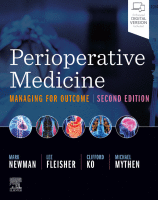Physical Address
304 North Cardinal St.
Dorchester Center, MA 02124

Introduction Transfusion therapy is necessary and can be lifesaving in surgical patients. However, despite being the standard of care for blood loss and anemia, it has never undergone the rigorous, randomized testing required of a new therapeutic agent, including assessment…

Venous thromboembolism (VTE), including deep vein thrombosis (DVT) and pulmonary embolism (PE), is a common, preventable perioperative complication occurring in up to 5% of noncardiac surgical patients. Even when treated, DVT can lead to long-term consequences, including chronic edema, dermatitis,…

Undergoing general anesthesia for an elective operation has become exceedingly safe and is now rarely associated with mortality. With the improvements in perioperative screening, risk reduction, and intraoperative management, we can now focus on and improve the quality of postoperative…

Introduction Neural function is essential to human existence. Thus, loss of any neural element in the course of a critical illness represents a major loss to a given individual. Neurons or supporting elements may be lost in a small, virtually…

Introduction Acute spinal cord injury (SCI) is a devastating medical condition because of the impact of permanent disability produced by paraplegia or quadriplegia. Treatment of the initial injury and reintegration of the injured patient into society place a large burden…

Introduction Multiple advances in perioperative techniques, especially the maturation of cardiopulmonary bypass, have allowed the practice of cardiac surgery to develop rapidly. Despite these advances that have enabled contemporary cardiac surgery to address a diverse range of cardiac pathologies, neurological…

Anesthesia for Carotid Surgery In the United States, each year approximately 795,000 people experience a new or recurrent stroke. Approximately 610,000 of these were first attacks and 185,000 were recurrent attacks. In 2016 the age-adjusted death rate for stroke as…

Introduction What Are Postoperative Pulmonary Complications (PPC)? PPC have been defined in a variety of ways, reflecting the lack of consensus. At its broadest, PPC may refer to almost any pulmonary (respiratory) complication that follows surgery. Complications related to the…

Introduction Safely guiding the patient with renal failure through the perioperative period presents a challenging set of problems such as the substantial comorbidity associated with chronic kidney disease (CKD), the risk of acute kidney injury (AKI), management of perioperative dialysis,…

* Previous edition author. Oliguria is a one of the commonest clinical problems encountered by critically ill patients. The prevalence of the problem has been difficult to establish because of a wide variety of definitions used in the literature. Some…